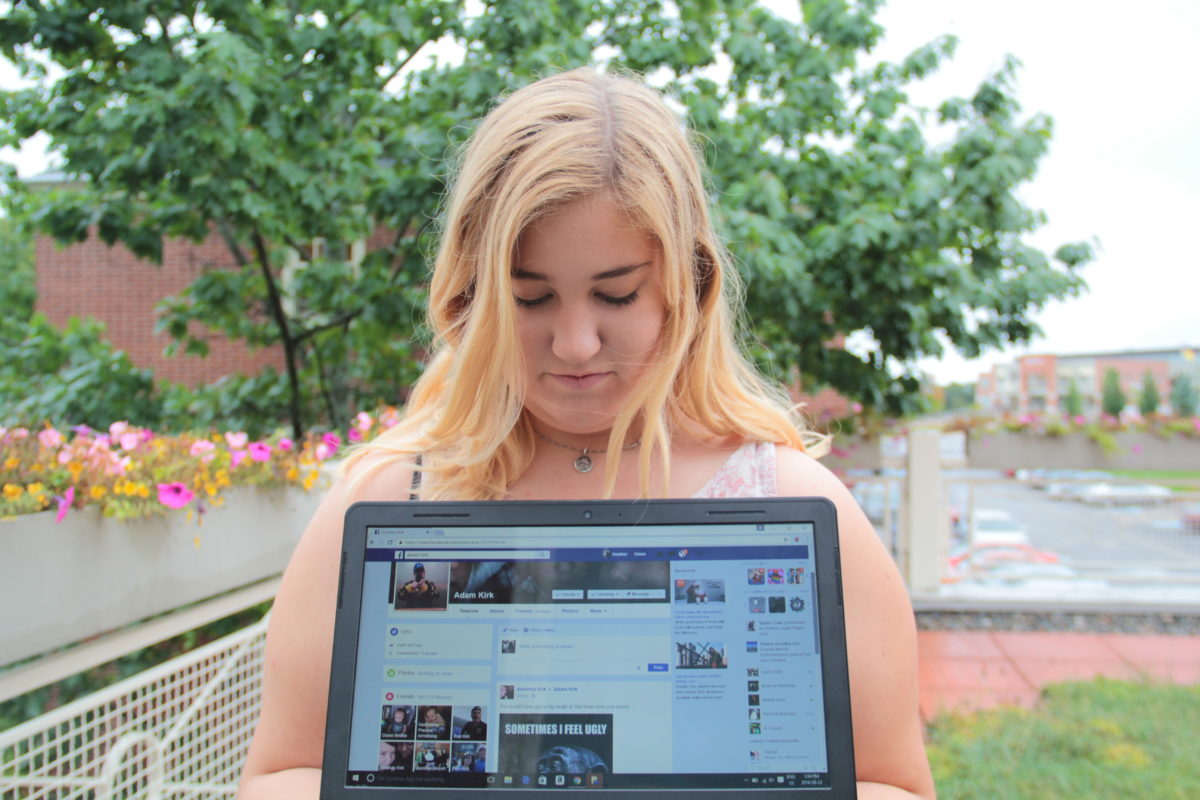
Heather Kirk lost her cousin on Dec. 26, 2014. A few months later, on Oct. 22, 2015, her father passed away.
Ever since, the former St. Thomas University psychology student now studying at the University of New Brunswick, and her aunts mourn both of them on social media sites like Facebook and Instagram by making posts and uploading photos with them.
Grieving through social media for Kirk and her aunts is a coping mechanism that helps them heal.
“I’ve posted quite a few pictures of me and my dad on my Instagram account. In January, when his birthday came up I posted a picture of me and him. On my mom and dad’s anniversary I also posted one,” said Kirk.
Sharing memories makes her feel better every time.
“I feel like Facebook is really good for my family. I love when my aunt Shelly uploads pictures of my dad or my cousin Adam. It makes me feel better. It helps.”
Heather’s dad didn’t have a Facebook account, but her cousin Adam did. Her aunts kept Adam’s profile even after he passed away.
“It’s really helpful for my aunts. They comment like ‘Hey buddy. Miss you lots.’ I’ve never commented on Adam’s profile but I see what my aunts write. I feel like they would never get rid of that profile and I wouldn’t either.”
Kirk said leaving him messages on Facebook is her aunts’ way to communicate with her son.
“I wish my mom, my sisters and I had something like that. It would have been nice to write messages to him. I talk to my dad, but it would have been nice to have a profile for him.”
Kirk has many pictures with her father. She even made a collage with them on her wall. But posting these pictures on Facebook guarantees her they will be saved here forever. There’s no risk of them being lost or ruined and Kirk can go back to look at them any time she wants to.
“If anything was to ever happen to the pictures I can easily go onto Facebook or Instagram with the captions of when the pictures happened.”
Catherine Tuey is an assistant professor in the department of Sociology at St. Thomas University. Her specialty and research topics are dying and memorialization.
She explained that people have different ways of grieving and experiencing loss.
“Some people in my study did use Facebook as a way to memorialize someone. To clarify, there’s different ways that Facebook can be used. It can be used by loved ones to express their grief or loss that they experienced. While others might use Facebook as a way to keep the pages of the person that has deceased.”
On Facebook specifically, you can send a request to make the profile of someone into a memorial page or you can request to have the profile removed once they pass away.
Tuey explained that Facebook “gives people a way to memorialize, it gives them a way to express what it is they may be experiencing.”
But in terms of helping people cope, Tuey says it’s difficult to say if social media sites help or not since it varies greatly from person to person.
“Some people might find Facebook as a good way for themselves just because they might want to share it with more people. Other people might prefer more privacy,” said Tuey.
Dalton Heagney, a first-year student majoring in kinesiology at the University of New Brunswick, is one of those who prefer privacy. His best friend passed away when he was 13 years old and his father passed away two years ago, when he was 17.
Heagney’s only Facebook post related to his losses was changing his profile picture to one with his father. He understands everyone has different ways to cope with loss, but social media just isn’t his way.
“I find Facebook is really personal now and it shouldn’t be. There are some things that shouldn’t be talked about in a public place like that. Something so sentimental, I keep it with me and talk about it with people I love,” he said.
Many kids wrote on Heagney’s friend’s profile when he passed away. Most of these kids weren’t even their friends.
“I feel that a lot of the times people post things it almost feels like a competition for who was closest to them, which definitely isn’t the right thing to do,” he said.
Instead of going to Facebook to post things, Heagney thinks talking about it with close friends or family is a better approach to heal.
“It’s more special when people talk face to face. I don’t think social media is the best connection.”
However, he understands it’s sometimes the only way to share with family or friends who live far away.
For example, Kirk has a lot of family in California and Western Canada. Now that her dad’s one-year anniversary is coming up, her mom called her to ask if she and her sisters wanted to put a piece in the local paper, which is pretty expensive. Kirk and her sisters said they preferred to post a memorial on Facebook.
“They [her family] won’t get the paper but they will see it on Facebook.”
Even though Heagney wouldn’t write posts mourning or grieving, he agrees Facebook is a good place to store photos with loved ones like Kirk does.
When Kirk looks at the pictures she uploads to Facebook with her dad, all of her sadness is taken away.
“It makes me smile. It takes me back to that moment; six years old again, sitting on my dad’s lap at a Tim Hortons drive-thru.”
